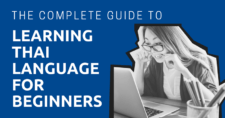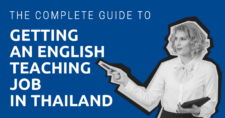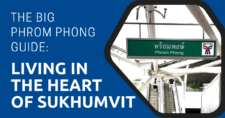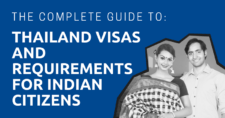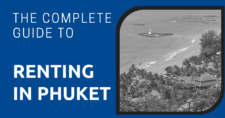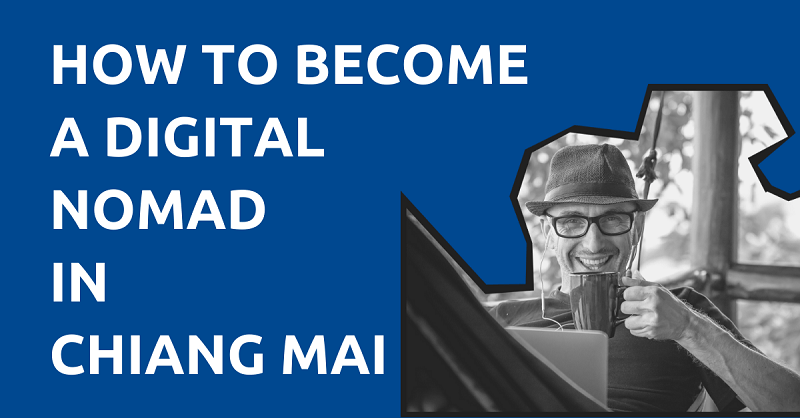
Money was tight. My business was languishing. My personal life was in the dumper and I was not a happy man. One of my best friends said only one thing to me, “Come to Chiang Mai.”
His words changed my life. Traveling to a foreign land seemed like a stretch, both financially and emotionally, but having lost it all, I had nothing else to lose.
In this guide on how to become a digital nomad in Chiang Mai, I’ll outline a few of the benefits, give you some practical advice, and even give you a blueprint for getting your toe in the water.
"*" indicates required fields
Disclaimer: This article may include links to products or services offered by ExpatDen's partners, which give us commissions when you click on them. Although this may influence how they appear in the text, we only recommend solutions that we would use in your situation. Read more in our Advertising Disclosure.
Contents
(And How It’s Costing Them)
Most expats throw money away, get lost in red tape, and miss the local hacks that make life easier and cheaper. ExpatDen Premium gives you the secrets seasoned expats use to save, earn, and thrive beyond the basics, saving you thousands and opening doors you didn’t even know existed.
Here’s what’s inside:
- Housing Hacks: Slash your rent by 40% or more - because the locals are laughing at what you’re paying.
- Banking Mastery: Stop wasting on fees and get top exchange rates. Why give your money away?
- Healthcare for Local Prices: Quality treatment without the expat price tag.
- Visa and Legal Shortcuts: No more bureaucratic nightmares. Get the visa and residency secrets that others pay their lawyer dearly for.
- Deep Discounts: Find the savings locals rely on for groceries, dining, and more.
If you’re serious about making Thailand work for you, join ExpatDen Premium and make Thailand work for you.
Why Chiang Mai?
Chiang Mai is a great place to spend a vacation. We know that much.
But Chiang Mai makes the perfect place for digital nomads. But what it boils down to is weather, atmosphere, community, and cost of living.
Aside from January through April, which is the crop burning season in Chiang Mai, the weather tends to be much cooler than the weather in Central and Southern Thailand.
On top of the weather, Chiang Mai is just an all-around great place to live. There are less tourist traps and there is more nature than what’s found in Bangkok or Phuket.
And lastly, the digital nomad community in Chiang Mai is strong. There are networking events many times of the year that feature speakers from all over the world and within Thailand who spoke about a wide variety of topics related to the digital nomad lifestyle.
Visas
One of the more important topics of becoming a digital nomad is your visa.
Previously, it was one of the biggest challenges for digital nomads in Thailand. However, things have changed, and it has become one of the biggest pros of being a digital nomad in Thailand instead.
Digital nomads in Thailand are now covered under the Destination Thailand Visa, or DTV visa for short. There are mainly two requirements:
- You need to have at least THB 500,000 or the equivalent in your currency in your bank account.
- You need to have proof of being a digital nomad, such as your portfolio, freelance contracts with clients, and so on.
You can apply for the visa online. After it’s approved, you can stay in Thailand for up to five years with it. It’s one of the best digital nomad visas in Asia.
And if you don’t have proof of being a digital nomad, it’s possible to get this visa through cultural activities like learning Muay Thai.
Read our in-depth guide to the Destination Thailand Visa to find out more.
So, if you are planning to be a digital nomad in Chiang Mai or another part of Thailand, get this visa. Don’t just come here with a tourist visa and keep doing border bounces. It’s not legal, and you risk being denied entry to Thailand.
Financial Benefits
Many digital nomads choose to set up shop in Chiang Mai because their money goes some much further here than it does in the West. Consider health costs, for instance.
Last year I had two elective procedures done here. The first was a full eye exam. I went to one of the best eye clinics in the country. In addition to a glaucoma screening, pink eye medication, and an exam by a physician, I was greeted by four receptionists and didn’t wait more than two minutes. I was out in under an hour. The total cost? $32.
Your dollar simply goes further here. These financial benefits translate into a much cheaper cost of living, which I’ll discuss in greater detail in another section.
Flights
Getting to Chiang Mai from Suvarnabhumi Airport, or BKK, is quite easy. It’s a major hub for Southeast Asia and nearly every major airline flies into and out of BKK.
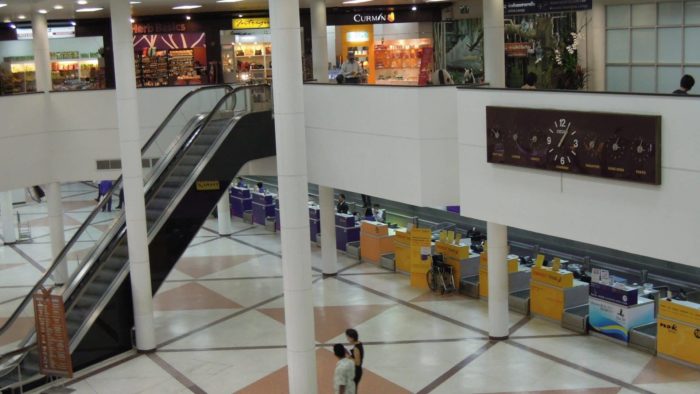
You can go from Bangkok to Chiang Mai from Don Mueang, as well. This airport was the original main airport for decades until Suvarnabhumi was built. Don Mueang, or DMK, is pretty much up to modern standards but not as busy as BKK.
While there are hundreds of flights from North American, Europe, and Asia to Thailand, getting to the kingdom from North America or Western Europe usually comes with a layover.
I’ve traveled here over fifteen times, and most of the time, a flight from Chicago to Thailand includes a layover in Japan, Korea, or China. If you go east to west, a layover in Doha or Frankfurt is more likely.
As a digital nomad, I traditionally book one-way flights because I don’t plan on leaving! Even though I am not a permanent resident of Thailand (we’ll cover that in a bit, too), a digital nomad visa will get you pretty well immersed. Booking a one-way flight gives me maximum flexibility.
But most airlines will want to see your return ticket before allowing you to board a flight into the country. In addition, when getting a Visa from the Thai embassy, they’ll need to see onward travel for you as well.
Once you are in Thailand, you’ll find local flights to Chiang Mai to be cheaper than a bus ticket in the West. I am amazed I can fly from Bangkok to Chiang Mai (equivalent of flying Chicago to NYC) for under $50 one-way.
Cost of Living
Startup budget to get established in Chiang Mai would have to be at least $5,000. That’s to pay an advance and a few months rent when renting an apartment in Chiang Mai, a motorbike (to save on transportation costs), and the cost of some household items. Set aside $1,500 to cover emergency medical costs.
After that, you could probably live on $1000 a month after you’ve covered the startup expenses and set aside some emergency funds. As you get regular income, increasing this to $1,500 still wouldn’t hurt and you’d be living pretty comfortably if you’re alone.
There are varying degrees of lifestyle, of course. On my first trip here, my buddy set me up at a five-star hotel suite. It was easily 1,000-square feet and is technically a six-star hotel by Western standards. It only costed $85 per night.
Now, as I live here six to eight months out of the year, I am more comfortable with getting an Airbnb or using some of the lesser known hotels that are massively abundant. I rarely spend more than $45 a night though. But you could find a place to rent for a lot cheaper.
Here’s an example of lifestyle in Chiang Mai with $1,350 budget a month.
Internet
A 500mbps connection in Thailand costs around $20 a month, while this same subscription would cost three times the amount in the US. But the fact that you are a digital nomad means you often have free internet connection everywhere, including in your accommodation, in the café where you’re having coffee, and so on.
What’s even more amazing is that Thailand’s internet speed is the second fastest In ASEAN, just behind Singapore.
To put it simply, internet in Thailand is cheap, fast, stable, and widely available throughout the country.
Food
In Chiang Mai, there is a wide range of the quality and low-priced food. You can easily have a decent meal for less than $2 at street-side restaurants that are quite literally an extension of the homeowner’s kitchen. Or you can have a meal in the heart of Chiang Mai for $25 that would be easily $100 or more in the America.
Regardless of your appetite or wallet, you can eat for a lot less in Chiang Mai.
Housing
In the more expensive cities in the US, the average rent is $1,200 monthly, but in the more affordable places, expect to pay between $600 to $750 a month. Now, think of a modern two-bedroom apartment located in the city center of Chiang Mai. That will cost you $350 to $450 a month, sometimes including household items.
And average utilities? $85.
Find out more: The Complete Guide to Renting in Chiang Mai
Where to Stay
Chiang Mai is a wonderful place for digital nomads to set up shop. Like most of the popular places in Thailand, it’s an eclectic mix of ancient temples, traditions, and culture interwoven with new condos, hip bars, and happening restaurants. Although a separate guide can be written on all the sections of Chiang Mai (Yes–there are that many.), I’ve narrowed down three of the most popular spots for digital nomads.
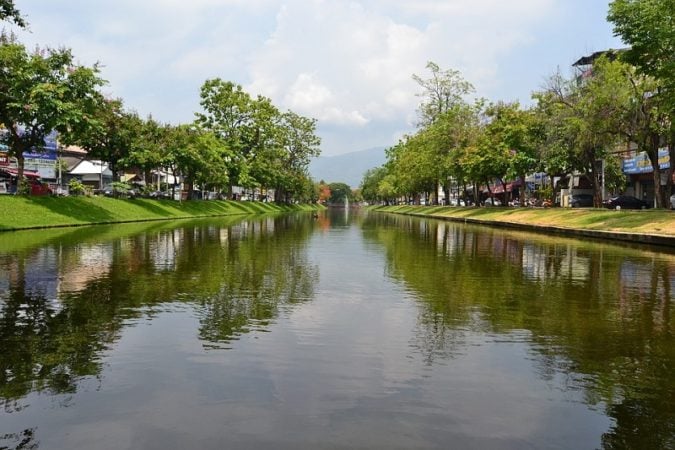
The Old City
Although The Old City might come up as a tourist attraction, it offers a lot of benefits for digital nomads who are just getting their feet wet in Thailand. You won’t find many fancy places to rent. But the serviced apartments available in the area come at a cheap price. There’s also lots of coffee shops. And being The Old City, you get a taste of Thai culture as well.
Nimmanhaemin
Nimmanhaemin is one of the trendier spots in Chiang Mai. And because of the number of cafes and restaurants and other attractions, it makes it one of the favorite places for digital nomads who want to make Chiang Mai there home. Nimmanhaemin has seen quite the boom in the last few years, so expect prices to be higher than other areas of Chiang Mai.
Santitham
Santitham is another great place for digital nomads who want to make Chiang Mai their home. Like Nimmanhaemin, Santitham is growing, and there are a number of places to rent for the new or just-starting-out digital nomad.
On your downtime, there’s no shortage of attractions to experience as well.
Renting Apartments
If you are just testing the waters before deciding to settle in Chiang Mai as a digital nomad, you can rent an Airbnb room instead of paying an advance for an apartment. There are clean, efficient, and cozy hotels you can snag for as little as $15 per night.
Please note that you need to book an Airbnb for more than 30 days. Otherwise, it’s considered illegal here.
If you’re already set on living in Chiang Mai, then you can look for a long-term lease. The easiest way to to search for rental properties is to use a website like hipflat. Hipflat makes it easy to search for rental properties based on your needs, like whether you want to rent a house or a condo, how many bedrooms you’d like, and how much you want to pay.
Listings start at THB6,000 per month and go up to THB180,000 per month. I imagine if you’re just getting started, you’ll probably want to start on the lower end of the price list.
Whichever property website you use to search for rentals, be sure to look with a skeptical eye. You might find some listings for only THB900 per month. But owners post these low prices as a way to lure in potential tenants. As the saying goes: All is fair in love and war.
Getting Around
You’ll have no problems getting around Chiang Mai. You have three main options for traversing the city. Well, four if you count walking. The three ways are renting a motorbike; using taxis, tuk-tuks, or Grab; and taking public transportation.
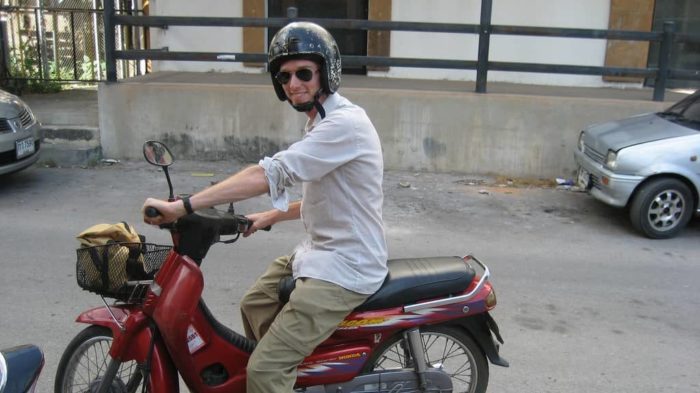
If you plan on staying in Chiang Mai long-term, consider buying or renting a motorbike. But don’t forget to get your Thai driver’s license first. Police are cracking down on unlicensed drivers throughout Thailand. You could probably rent a motorbike for 2,500 baht to 3,000 baht per month.
Taxis, tuk-tuks, and Grab are another option for digital nomads. But the cost of using these everyday adds up overtime. So use them judiciously.
Public transportation would be your cheapest bet. For just 20 baht to 50 baht, you could get anywhere in the city on a songthaew, or covered pickup truck with benches. However, I still riding a motorcycle the best way to get around here.
But if you are planning to be here long-term, you can buy a car instead. You can even ride it during heavy rainy days.
Co-working Spaces
Chiang Mai is also known for it’s co-working spaces. In Chiang Mai, at Maya Shopping mall, there is a large co-working space on the top floor called CAMP (Creative and Meeting Place). It has super fast WIFI and working there is free for the first hour.
But after that you’ll need to order at least 50 baht worth of food from the café to get a 2-hour wifi voucher. It’s also open twenty-four hours a day.
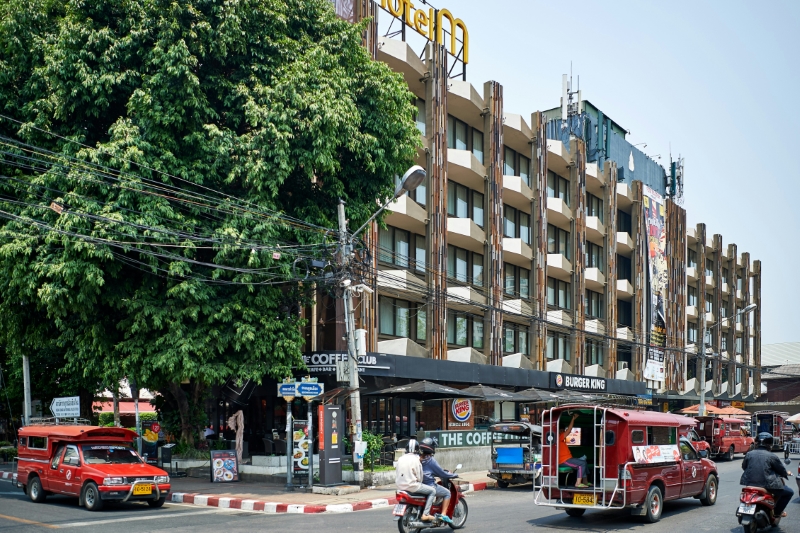
There are other areas to find wifi as well. Personally, I lean towards Starbucks and hotel lobbies. Starbucks generally gives you twelve hours of free internet access and the speeds are pretty good.
A hotel lobby may cost you a bit more to hang out there (always order a drink from the bar) and is a bit quieter than a Starbucks.
Depending on your need for either buzz or quiet, working from your own hotel or Airbnb is also an option. I always ask the host or hotel about their internet speed before committing to a place to stay, however. The speed can vary greatly depending on their setup.
Finding Work
When you come to Chiang Mai on a tourist visa or even a digital nomad visa, you are technically prohibited from working. Thailand is very protective of their economy, and they don’t want foreigners to take jobs away from Thai people. If you choose to work here, even digitally, you may be in violation of their rules.
If you come here with a digital nomad visa, known as the Destination Thailand visa, you can work online for a client outside of Thailand without a problem.
If you are here with a tourist visa, you just need to be careful that it might not be legally correct. While I’ve never heard of any digital nomads getting prosecuted for working from a Starbucks, it’s important to be aware that you may be breaking the law by doing so.
These laws are similar to what you’ll find in other countries that prohibit any kind of work on a tourist visa. In practice, Thai authorities haven’t shown a lot of indication that they want to fight this on a significant scale. The masses of digital nomads you see working in coffee shops don’t seem to care either.
On the other hand, as a digital nomad you’re not taking a job away from a Thai person if your clients are located outside of Thailand. So you could argue that as a digital nomad, when you serve clients in your home country from your computer, you’re not breaking the rules nor the spirit of the Thai law. But you should work at your own risk.
If you are new to working remotely, you’ve got your work cut out for you. You’ll need to be mindful of your time and be able to sell yourself. Once you get work, balancing your prospecting sales time with production time is a dance that you must watch over constantly.
Not busy enough? Go sell something. Too busy with work? Just wait. It’ll run out and you’ll have to sell.
When I got started, I went after the low-hanging fruit—my current network of friends and family. People always want to help out a new business. It’s the American dream, even if you are not in America. So, don’t be shy. Proclaim what you intend to do and ask if anyone knows of anyone else looking for work.
The number one activity to start with is simply to ask. Or look online. We have an in-depth guide to finding work in Thailand.
And although there are some resources in the guide for finding work at brick and mortar companies, a portion of the strategies revolve around finding work as a digital nomad in Thailand.
Getting Paid
Unfortunately, PayPal doesn’t work well in Thailand. An alternative way is to can set-up a multi-currency account from Wise and get a Wise card after that. With it, you can get paid in multiple currencies including USD, EUR, GBP, and so on. Then, you can convert to Thai Baht, without losing out on currency exchange rates, and use Wise card to withdraw money and pay for many things in Chiang Mai.
It’s very hard for digital nomads to open a bank account in Thailand. I’ve rarely heard of anyone here being able to open a bank account in Thailand as a digital nomad unless they have another long-term visa or use an agent to do it.
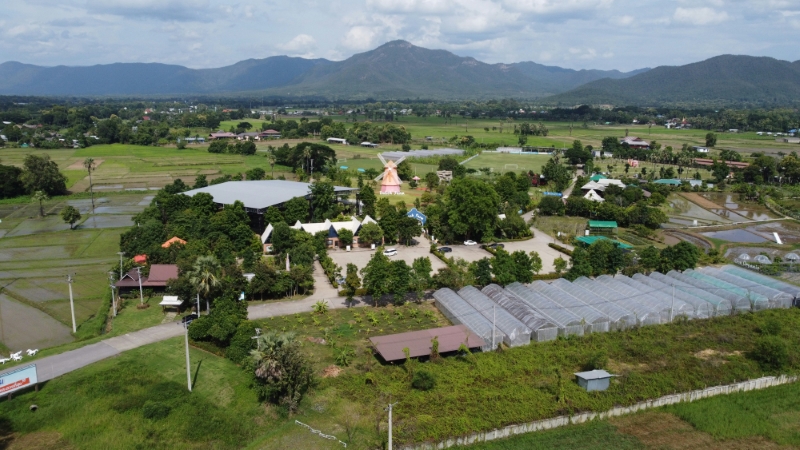
As a freelancer, you may also consider accepting credit cards online through portals like Stripe and Squareup. Both of these companies are well established and you can access your funds within 24 to 48 hours of receiving payment.
Paying Taxes
Just because you’ve left your home country doesn’t mean you should stop filing taxes. American citizens, for example, are still required to file and possibly pay taxes on all worldwide income, depending on how much you make. If you don’t file and pay taxes, you could have your passport revoked.
For more info on paying taxes while living in kingdom, check out our in-depth guide to paying US taxes from Thailand.
Health Insurance
As I mentioned in the beginning of the this guide, healthcare in Thailand is cheap compared to costs in the West.
But you should still consider getting health insurance in Thailand for those major accidents and medical emergencies happen. And trust me, they happen to all of us.
It could be taking a spill on your motorbike, getting injured while exploring nature, coming down with a serious illness, or having a baby in Thailand. All of these instances and more will be a lot easier on your pockets if you have insurance.
I’ve read many stories of tourists without insurance who needed to create a GoFundMe page for financial support with hospital bills and repatriation. Honestly, it’s not a good thing at all. So, I would recommend anyone to get a health insurance plan. It can be just an in-patient plan that comes with a high deductible, so the plan will be affordable. You’ll only need to use it when you really need it.
So, after you’re done reading this article, read the following guides:
- Thai Health Insurance: Here’s What You Need to Know as an Expat
- Thailand Travel Insurance: Companies, Requirements, and Advice
- Insurance options in Thailand
Communities
Chiang Mai is now one of the world’s hubs for digital nomads. No matter your nationality, you can find like-minded people to hang out with. The amazing expatriate experience that Chiang Mai offers is one of the reasons why it’s attracting more and more digital nomads.
Here are some resources to help you connect with like-minded digital nomads in Chiang Mai.
- Chiang Mai Digital Nomads: A private Facebook group consisting of over 40,000 members who discuss all things related to the digital nomad lifestyle in Chiang Mai.
- Digital Nomad Coffee Club – Chiang Mai: A 16,000-plus community of digital nomads who meet up in real life for coffee.
- Chiang Mai Digital Nomads Graphic Designers and Illustrators: Although having less members (just under 500 at the time of this writing), the topic is very niche and could benefit graphic designers and illustrators in Chiang Mai.
Challenges
Being a digital nomad in Chiang Mai does present some challenges. But if you could overcome most of the challenges below, you should excel here in the kingdom.
Culture
Learning all the customs of Thailand can take a while. It’s important to learn what is permissible and what is downright offensive. For example, in Thailand you must remove your footwear when going into temples, residences, and some businesses.
With interpersonal relations, a majority of people are less straightforward compared to those from the West. It’s not what’s said in Thailand, but often what’s not said. So flexibility is not only important, but critical to managing relationships in Thailand.
Respect is another important part of Thai society, especially when it comes elders, the royal family, and religion.
Beyond culture, a common challenge is language.
Language
On one hand, most Thai people don’t have a solid command of the English language. You’ll find yourself speaking in short, clipped sentences that most people can understand. Google Translate and other language apps are a big benefit here.
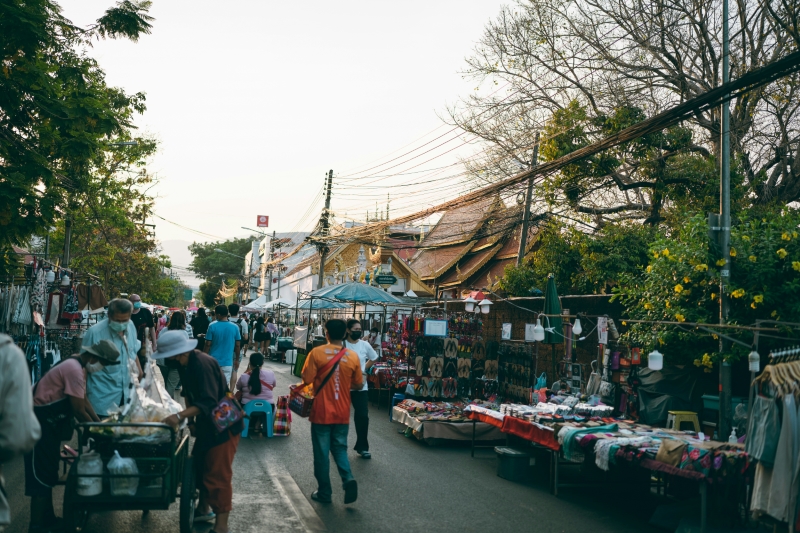
On the other hand, technically speaking, the English language has a quite a few extra (and often unnecessary phrases. When you state briefly and directly what you want to communicate, it forces you to get to the point. And that’s a good thing.
For example, “Where is the toilet?” can easily be stated as “Toilet?”
But if you plan on staying in Thailand long term, learning the language is a must. We’ve dedicated an in-depth guide to learning Thai, so be sure to check that out.
Income
By far, the biggest challenge you’ll most likely face as a digital nomad in Chiang Mai is earning a steady income.
Unless you have set up your business to earn a steady $5,000 to $10,000 or more per month, and have a disciplined team to help you, distractions and the solo-preneur lifestyle can be a challenge.
But, for many people, the digital nomad lifestyle is the way to go. In order to build my business, I train my clients to work with me via Zoom. Deriving a consistent income takes work—a lot of work.
If you are easily distracted by the bright lights of the city, elephant sanctuaries, Buddhist temples, or the crazy nightlife, you must discipline yourself to set up your work environment to avoid those things (at least most of the time).
You’ll find hundreds of expats drinking away their pensions in Thailand. If you don’t want to become a Facebook Meme, make daily appointments with yourself for your health, fitness, and business.
With no boss to hold you accountable, it’s easy to procrastinate.
Air Pollution
Air pollution is the biggest problem in Chiang Mai, in my opinion. During the burning season every year from January to April, on a bad day, the AQI can exceed 200, which is hazardous to health, and you will see smog in the sky.
While I’ve seen improvements in recent years, nothing is really guaranteed.
So, during this time of year, you may want to live in other provinces with cleaner air, like Phuket or provinces in the south of Thailand instead.
Should I Become a Digital Nomad in Chiang Mai?
No one can answer this question better than you. In my opinion, there are hundreds of reasons why Chiang Mai is a great city for nomads. It’s like the nomad capital of Thailand for various reasons such as:
- Affordable cost of living. It’s 30%–50% cheaper than Bangkok, Pattaya, and Phuket.
- The lifestyle is really good. You can wake up and see mountains every day. It’s slow-paced but still full of convenience.
- There are many nice co-working spaces throughout the city with great coffee and good working environments.
- The nomad community here is big. You can make new friends easily. In fact, there are networking events for digital nomads in Chiang Mai almost every week.
On the other hand, Chiang Mai might not be a good idea for you if you:
- Want to live by the sea. It’s a mountain city several hundred kilometers away from beaches.
- Want to rely solely on public transportation. In Chiang Mai, it’s much more convenient to have your own private transportation.
- Want to live a busy life with great nightlife all the time. Bangkok is much better in this regard.
Anyway, nothing is better than seeing Chiang Mai with your own eyes. You can come here for a few weeks and see whether you like it or not. If not, you can just leave and go to other cities. We are digital nomads anyway.



